Vyvanse vs. Adderall for ADHD: What’s The Difference?
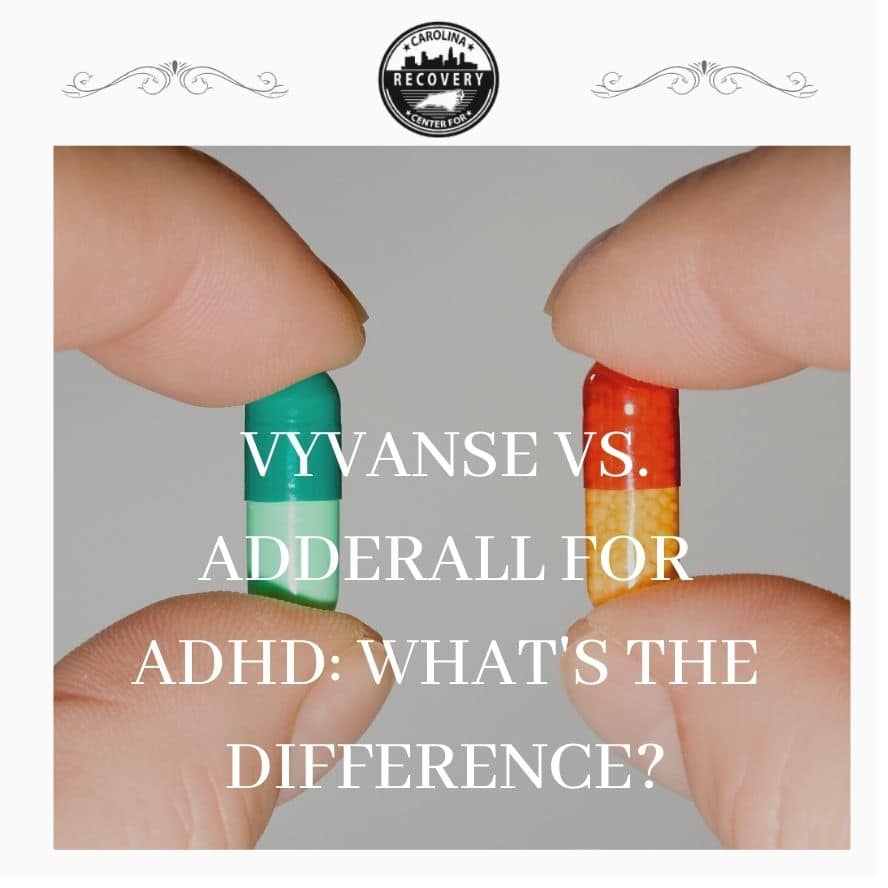
Medically Verified: 2/1/24
Medical Reviewer
Chief Editor

All of the information on this page has been reviewed and verified by a certified addiction professional.
Vyvanse and Adderall are two medications used to treat attention deficit hyperactivity disorder (ADHD). Both medications are stimulants that work by raising levels of dopamine and norepinephrine in the brain. These neurotransmitters help people focus, control their impulses, and be more successful at work or school.
Although both medications work in similar ways, there are a few major differences between Vyvanse and Adderall. Understanding the way these medications work can help individuals work with their doctor to decide which medication is right for them.
What is Vyvanse?
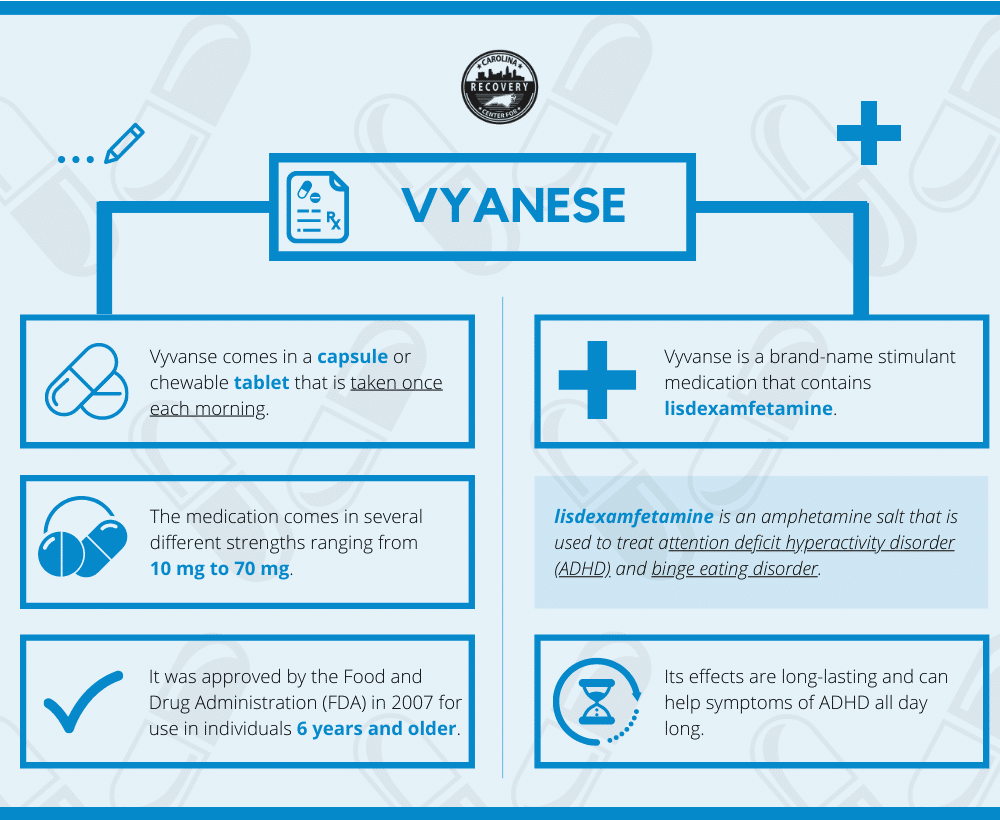
Vyvanse is a brand-name stimulant medication that contains lisdexamfetamine, an amphetamine salt that is used to treat attention deficit hyperactivity disorder (ADHD) and binge eating disorder. It was approved by the Food and Drug Administration (FDA) in 2007 for use in individuals 6 years and older.[1]
Vyvanse comes in a capsule or chewable tablet that is taken once each morning. Its effects are long-lasting and can help symptoms of ADHD all day long. The medication comes in several different strengths ranging from 10 mg to 70 mg.
Vyvanse Side Effects
Vyvanse should not be used in pregnant mothers or women who are nursing. It may also cause adverse interactions with monoamine oxidase inhibitors (MAOIs) and selective serotonin reuptake inhibitors (SSRIs).[2]
People who take Vyvanse may experience mild side effects. Mild and more common side effects of Vyvanse include:
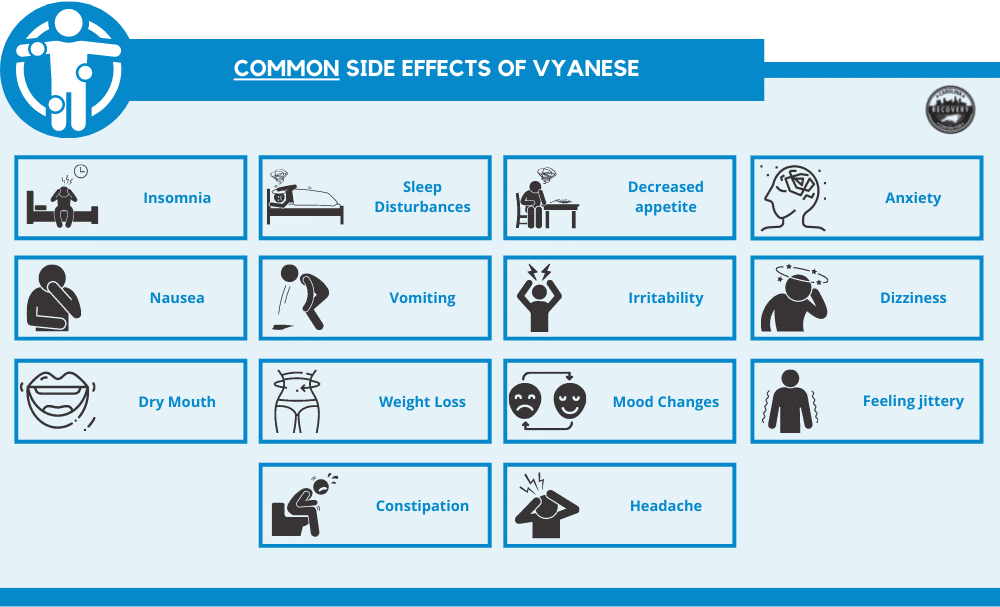
- Insomnia
- Sleep disturbances
- Decreased appetite
- Anxiety
- Nausea and vomiting
- Irritability
- Dizziness
- Dry mouth
- Weight loss
- Mood changes
- Feeling jittery
- Constipation
- Headache
Most of these side effects go away within a few days or weeks of taking the medication. Other more severe and rare side effects include:
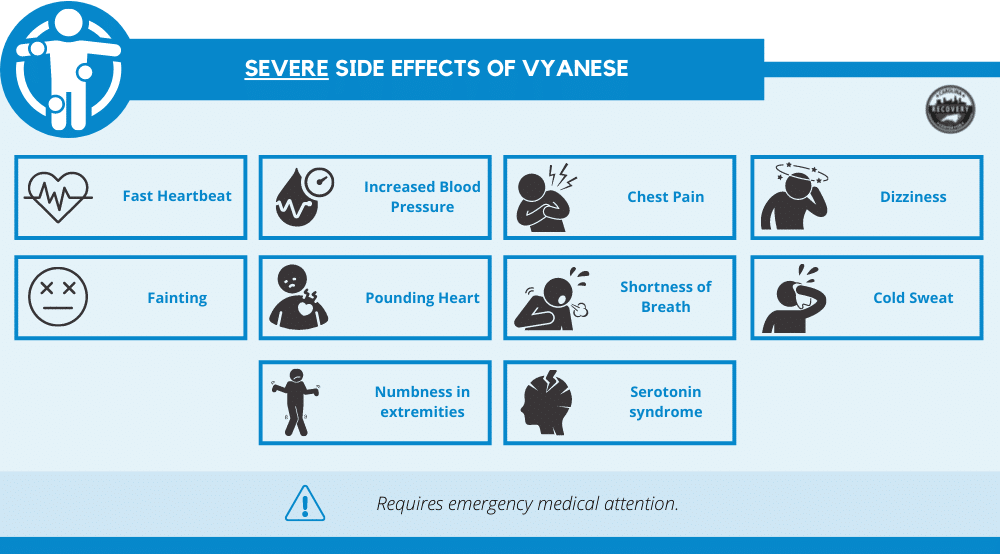
- Fast heartbeat
- Increased blood pressure
- Chest pain
- Dizziness
- Fainting
- Pounding heart
- Shortness of breath
- Cold sweat
- Numbness in extremities
- Serotonin syndrome (a life-threatening condition caused by a buildup of excess serotonin in the body)
Although rare, any of these side effects require emergency medical attention.
What is Adderall?
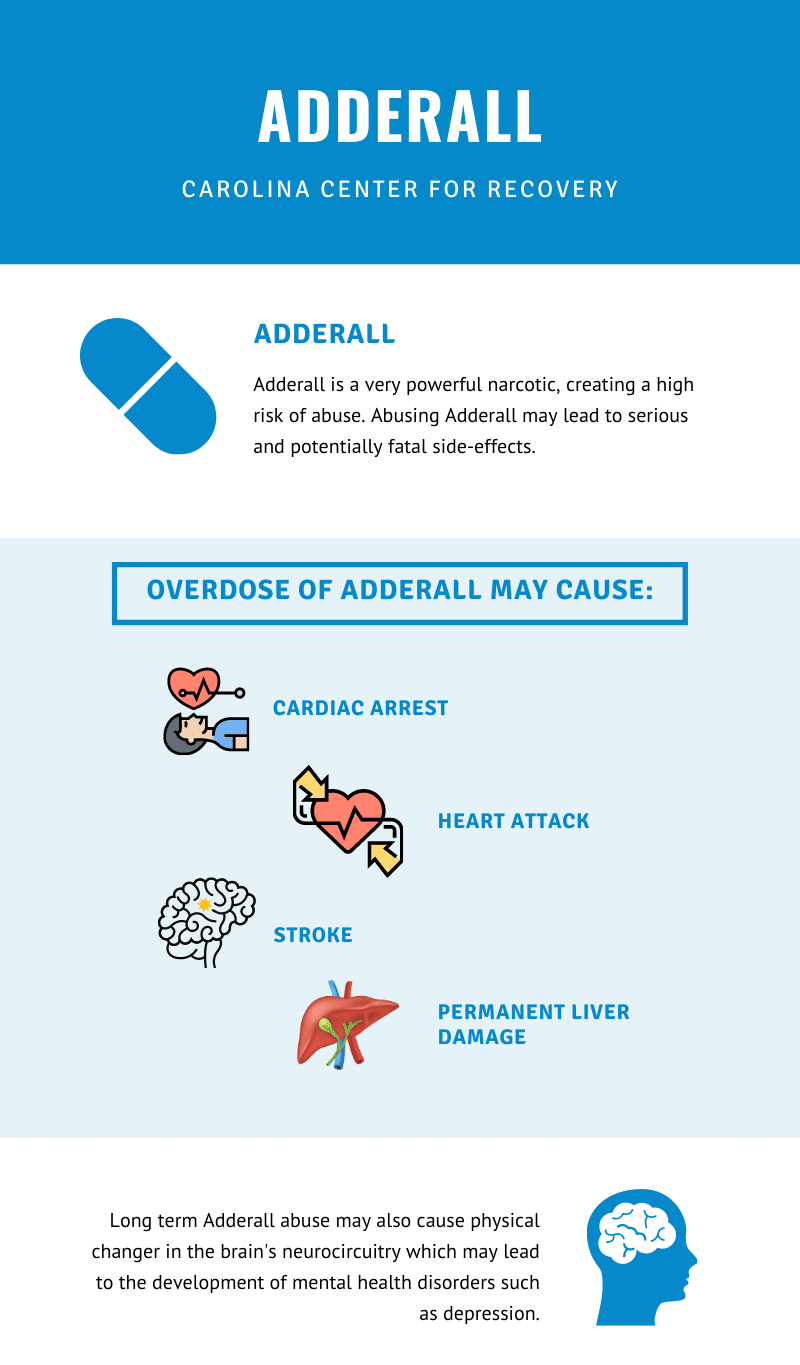
Adderall is a brand-name stimulant medication that is used to treat ADHD and narcolepsy. It was originally approved by the FDA in 1996 and may be used in people 6 years and older. Adderall contains four different types of amphetamines: dextroamphetamine saccharate, amphetamine aspartate, dextroamphetamine sulfate, and amphetamine sulfate. The mixture of these salts is often referred to as MAS.
Adderall is available in two different formulas: immediate-release (IR) and extended-release (XR). Adderall IR is short-acting and is taken 2-3 times each day, while Adderall XR is long-lasting and is only taken once in the morning.[3] Both Adderall IR and XR come in various different strengths.
Adderall Side Effects
Like Vyvanse, Adderall should not be used in pregnant or nursing women. It can also cause severe reactions when mixed with MAOIs and SSRIs.
Some common side effects of Adderall include:[4]
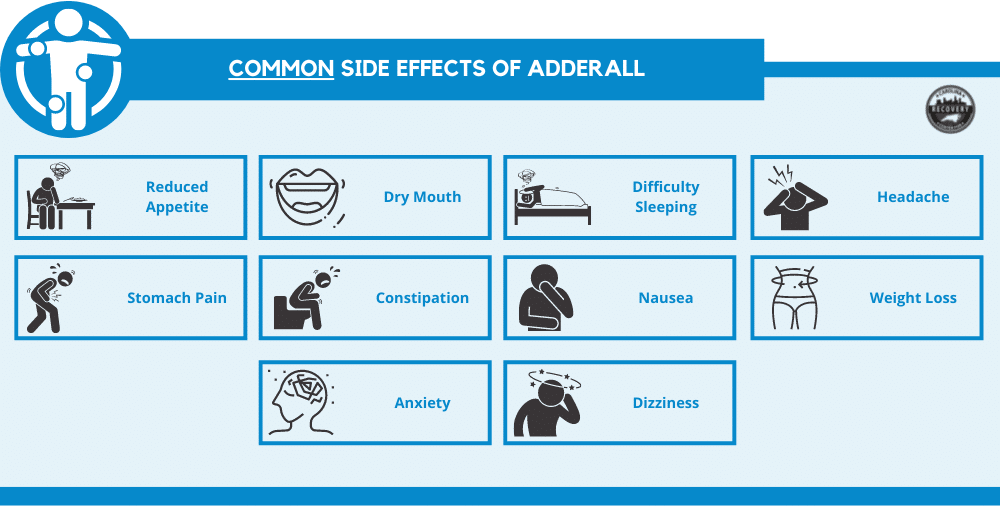
- Reduced appetite
- Dry mouth
- Difficulty sleeping
- Headache
- Stomach pain
- Constipation
- Nausea
- Weight loss
- Anxiety
- Dizziness
While these minor side effects usually subside within days or weeks of taking the medication, other more serious and rare side effects may require emergency medical attention. These include:
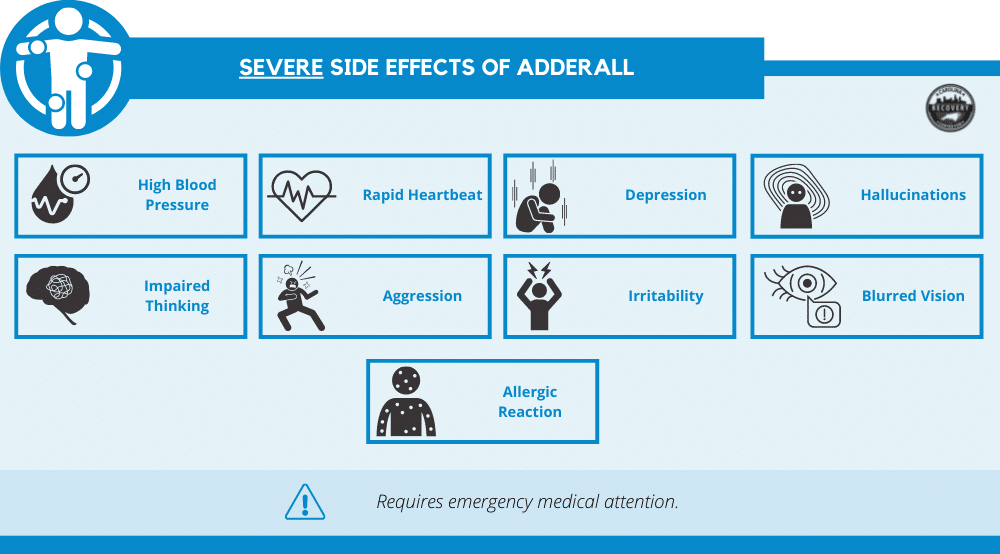
- High blood pressure
- Rapid heartbeat
- Depression
- Hallucinations
- Impaired thinking
- Aggression
- Irritability
- Blurred vision
- Allergic reaction
Main Differences in Vyvanse and Adderall
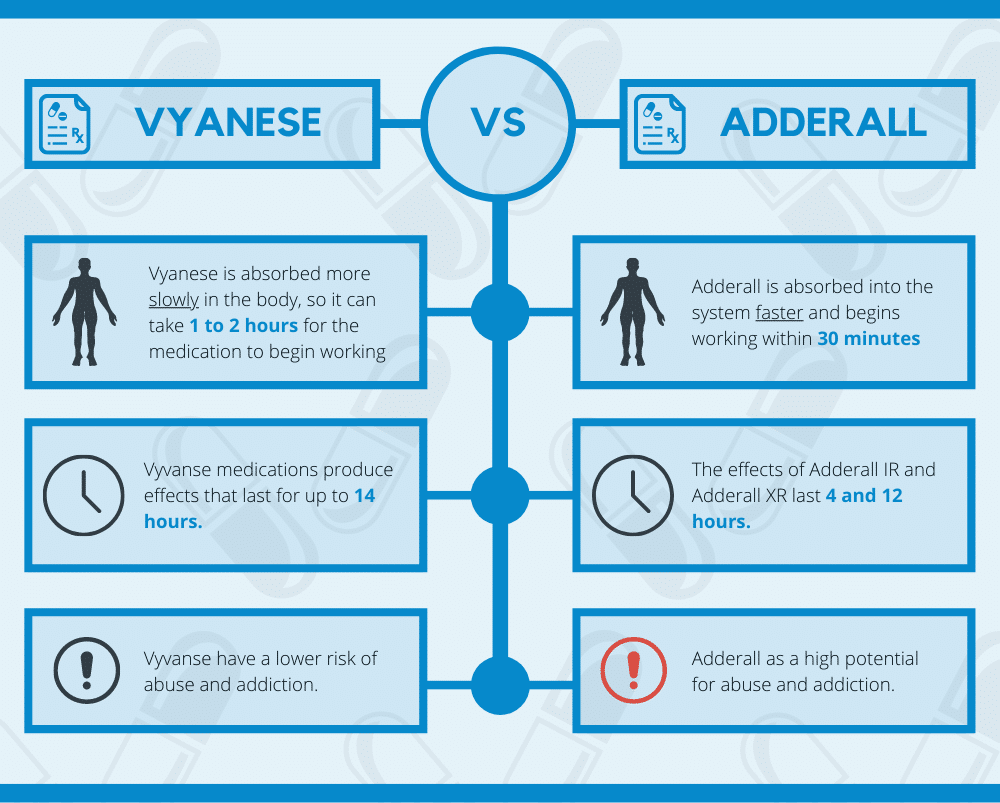
Even though Vyvanse and Adderall have many similarities, they are two very different medications. The main differences are the absorption rate and composition.
Adderall is absorbed into the system faster and begins working within 30 minutes. Vyvanse, on the other hand, is absorbed more slowly in the body, so it can take 1 to 2 hours for the medication to begin working. Similarly, Adderall comes in an instant release (IR) formulation and an extended-release (XR) one. The effects of Adderall IR and Adderall XR last 4 and 12 hours, respectively. By contrast, all Vyvanse medications produce effects that last for up to 14 hours.
Adderall contains a mixture of four different kinds of amphetamine salts. Vyvanse only contains one amphetamine salt – lisdexamfetamine. People who are allergic to any of the active ingredients in Adderall may take Vyvanse instead.
Another difference between the two drugs comes down to the potential for abuse. Vyvanse cannot be inhaled or injected, so it is thought to have a lower risk of abuse and addiction. Adderall, on the other hand, is a very commonly abused stimulant that has a high potential for abuse and addiction. Still, both Vyvanse and Adderall are Schedule II drugs, indicating a potential for abuse and dependence.
Lastly, Adderall has generic forms available, but there aren’t any generic forms of Vyvanse available on the market until 2023. This makes generic Adderall a more affordable option for some individuals.
Find Help for Prescription Stimulant Abuse and Addiction
Both Vyvanse and Adderall are safe and effective medications when used correctly. Unfortunately, both medications are addictive when abused, and many people who abuse them end up needing professional help.
Here at Carolina Center for Recovery, our dual diagnosis treatment programs can help address your co-occurring addiction and ADHD. We can help you get clean off your medication, find an alternative that isn’t addictive, and teach you how to cope with life’s difficulties without relying on drugs and/or alcohol.
Get the help you need right now by reaching out to one of our trusted addiction specialists.
References:

